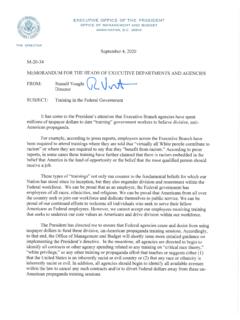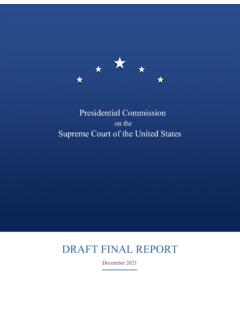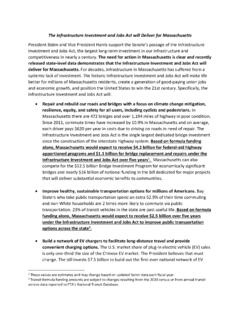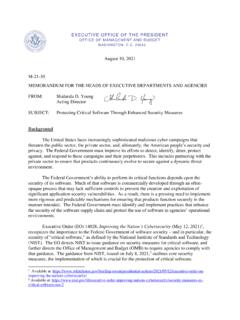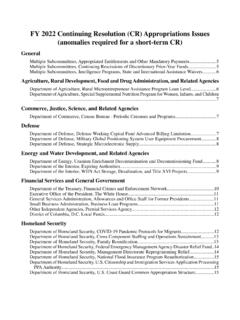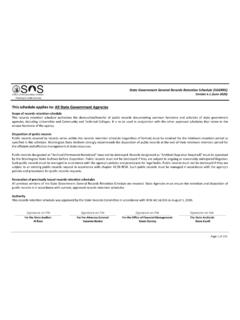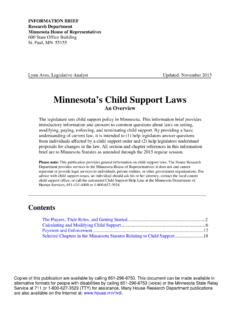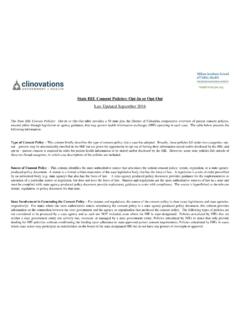Transcription of EXECUTIVEOFFICE OF THE PRESIDENT
1 EXECUTIVE OFFICE OF THE PRESIDENT O F F I C E O F M A N A G E M E N T A N D B U D G E T W A S H I N G T O N , D . C . 2 0 5 0 3 June 30, 2021 M-21-27 MEMORANDUM FOR HEADS OF EXECUTIVE DEPARTMENTS AND agencies FROM: Shalanda D. Young Acting Director SUBJECT: Evidence-Based Policymaking: Learning Agendas and Annual Evaluation Plans The Foundations for Evidence-Based Policymaking Act of 20181 (Evidence Act) urges the Federal Government to make decisions using the best available evidence. The complex issues and challenges facing the American people must be met with urgency, and doing so requires the use of facts arrived at through rigorous and systematic analysis, governed by principles of scientific integrity. In order to address these issues, it is critical to ensure, protect, and institutionalize the collection, dissemination, and use of high-quality evidence in a way that is informed by diverse viewpoints and methods.
2 Addressing and solving current national crises, such as the COVID-19 pandemic or economic downturn, as well as future crises, depends on using the best available science and evidence. This guidance responds to the Presidential Memorandum on Restoring Trust in Government Through Scientific Integrity and Evidence-Based It reaffirms and expands on previous OMB guidance on Learning Agendas and Annual Evaluation Plans, including OMB M-19-23,3 OMB M-20-12,4 and OMB Circular 1 Pub. L. No. 115-435, 132 Stat. 5529 (2019), available at 2 Presidential Memorandum, Restoring Trust in Government Through Scientific Integrity and Evidence-Based Policymaking (Jan. 27, 2021), 3 See Office of Mgmt. & Budget, Exec. Office of the PRESIDENT , OMB M-19-23, Phase 1 Implementation of the Foundations for Evidence-Based Policymaking Act of 2018: Learning Agendas, Personnel, and Planning Guidance (2019), available at 4 See Office of Mgmt. & Budget, Exec. Office of the PRESIDENT , OMB M-20-12, Phase 4 Implementation of the Foundations for Evidence-Based Policymaking Act of 2018: Program Evaluation Standards and Practices (2020), available at 5 See Office of Mgmt.
3 & Budget, Exec. Office of the PRESIDENT , OMB Circular No. A-11, Preparation, Submission and Execution of the Budget 290 (Apr. 2021), available at 1 Governing Based on Evidence OMB expects agencies to use evidence whenever possible to further both mission and operations, and to commit to build evidence where it is lacking. A culture of evidence is not a new idea, and there are already leading examples of this culture throughout government. Nonetheless, we cannot achieve our nation s great promise unless these pockets of excellence are expanded to become the core of how the Federal Government operates. This Memorandum affirms the Federal Government s commitment to the Evidence Act and to building and nurturing a culture of evidence and the infrastructure needed to support it. This includes strengthening the Federal workforce to ensure that staff with the right skills and capabilities are positioned across the Federal Government.
4 Therefore, heads of agencies , including Secretaries, Deputy Secretaries, and other senior leaders, should engage in creating a culture of evidence in their agencies and support their staff in undertaking this work. This effort demands a comprehensive approach, and implementing this vision will require resources and prioritization from leaders. At the same time, this commitment to an evidence-based government cannot happen solely at the top or in isolated analytical offices, but rather must be embedded throughout each agency, in program offices and management offices, and adopted by the hardworking civil servants who serve on behalf of the American people. Building on previous Evidence Act guidance, this document reinforces the central function that evidence-building broadly, and evaluation in particular, play in realizing the goal of evidence-based policymaking. The Evidence Act establishes critical leadership positions and activities to facilitate a culture of evidence.
5 Fundamental to this task are effective processes to strategically plan for evidence building, using the Evidence-Building Plans ( , Learning Agendas) and Annual Evaluation Plans as tools. The Presidential Memorandum on Restoring Trust in Government Through Scientific Integrity and Evidence-Based Policymaking requires OMB to issue guidance to improve agencies evidence-building plans and annual evaluation plans .. and consider whether such plans .. shall include a broad set of methodological approaches for the evidence-based and iterative development and the equitable delivery of policies, programs, and agency operations. 6 OMB conducted stakeholder engagement to draft this guidance in response to the Presidential Memorandum, and the importance of stakeholder engagement is highlighted throughout the requirements described here. This guidance applies to all agencies ; CFO Act agencies have a statutory requirement as described in Title I of the Evidence Act,7 and developing Learning Agendas and Annual Evaluation Plans benefits all agencies at both the agency and sub-agency levels.
6 It is only through this shift to a culture of evidence, supported and demanded by agency leaders and brought to bear across agency functions, that we will build and maintain trust in government and ensure that decisions best serve the American people. 6 See Presidential Memorandum, Restoring Trust in Government Through Scientific Integrity and Evidence-Based Policymaking (Jan. 27, 2021). 7 5 311 315. 2 Opportunities from the Evidence Act The Evidence Act provides a statutory framework to advance this vision for a nation that relies on evidence and data to make decisions at all levels of government. To do so, it calls on agencies to strategically plan and organize evidence-building, data management, and data access functions to ensure an integrated and direct connection to evidence needs. This guidance reaffirms and expands on previous OMB guidance on Learning Agendas and Annual Evaluation Plans, including OMB M-19-23, OMB M-20-12, and OMB Circular OMB recognizes that the collection, curation, governance, protection, and transparency of data are also essential for evidence-building but are outside the scope of this OMB strongly believes that implementing the Evidence Act is not a compliance exercise, and that agencies should develop the required Title I deliverables ( , the Learning Agenda, Annual Evaluation Plan, and Capacity Assessment for Statistics, Evaluation, Research and Analysis) in a way that fulfills their purpose as strategic, evidence-building plans.
7 agencies should not simply produce the required documents and then turn their attention elsewhere; success requires that agencies develop processes and practices that establish habitual and routine reliance on evidence across agency functions and demand new or better evidence when it is needed. OMB has provided, and will continue to provide, agencies with flexibility whenever possible for these Title I deliverables so that they can implement these requirements of the Evidence Act in ways that are meaningful and long-lasting. OMB s focus is on outcomes, a desired end state where agencies use all available evidence to make better program, operational, and other decisions, build evidence where it is lacking, and ultimately serve the American people more effectively. This is a key value proposition of the Evidence Act; the processes and required deliverables are often simply the means to achieve that end. Leadership to Build and Use Evidence Recognizing the need for strong leadership across the Federal Government to shepherd the changes envisioned by the Evidence Act, the Act requires the designation of agency Evaluation Officers, Statistical Officials, and Chief Data Officers.
8 The Evaluation Officer is responsible for leading the development and execution of the agency s Learning Agenda, Annual Evaluation Plan, and other evaluation activities in partnership with other designated officials and agency leaders. Importantly, the Evaluation Officer is expected, and for specific activities required, to coordinate and collaborate with the Chief Data Officer and Statistical Official. OMB also expects agency heads to play key roles in advancing evidence building and use in their agencies by prioritizing Evidence Act implementation and related activities. To realize the goals of Learning Agendas and Annual Evaluation Plans, Evaluation Officers must adhere to scientific integrity principles, demonstrate a learning and improvement orientation to the building and use of evidence, and have substantive expertise in evaluation methods and practices. Per OMB M-19-23, the Evaluation Officer must be appointed without regard to 8 See OMB M-19-23, OMB M-20-12, and OMB Circular No.
9 A-11. 9 See OMB M-19-23, at 4, which outlined phases of Evidence Act guidance. OMB still expects to issue guidance on Open Data Access and Management (Phase 2) and Data Access for Statistical Purposes (Phase 3). 3 political affiliation and possess demonstrated, senior-level technical expertise in evaluation methods and practices and .. appropriate expertise in the culture, disciplines, and policy areas of the agency. 10 More specifically, OMB has determined that the role should be filled by a senior career employee with the skills and expertise to maintain principles of scientific integrity throughout the evaluation process, ensure adherence to the agency evaluation policy, and maintain the standards in OMB M-20-12. Critically, the Evaluation Officer must also have sufficient time and resources to lead and execute this work, which requires limiting, to the extent practicable, the number of other roles that the Evaluation Officer is tasked to fill.
10 agencies are reminded that they must report any changes in their designated Evaluation Officer to OMB via email at and update their webpages accordingly. Further, upholding scientific integrity and strengthening the Federal workforce requires that agencies ensure that the Evaluation Officer and other executives and staff supporting Evidence Act work, including, but not limited to, evaluation, statistics, research, and other analyses, have the necessary skills and expertise. In some cases, an agency will have to hire new staff if current staff do not have the requisite skills needed to execute high quality Evidence Act plans, evaluation studies, and related activities. This is consistent with the standards in OMB M-20-12, which state that evaluation activities must be managed by qualified evaluators with relevant education, skills, and experience for the methods undertaken. Building a Culture of Learning and Evidence Across Government To create a more evidence-based government, Federal agencies should commit to building evidence where they do not have it, and to using existing evidence, sometimes in new ways and contexts.
